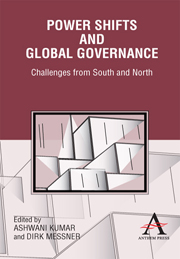Book contents
- Frontmatter
- Contents
- List of Contributors
- Foreword
- Power Shifts and Global Governance
- Part One Theoretical and Analytical Reflections on Global Governance
- 1 Introduction: Global Governance: Issues, Trends and Challenges
- 2 Four Lessons from the Present Global Financial Crisis for the 21st Century: An Essay on Global Transformation from a European Perspective
- 3 Global Civil Society: Emergent Forms of Cosmopolitan Democracy and Justice
- 4 Institutional and Policy Implications of International Public Goods: The Case of Global Commons
- 5 Economic Challenges for Global Governance
- 6 The Rule of Law in Multilateral Institutions and International Aid for Development: Judicial Reform in the Global Order
- Part Two Power Shifts, Regional Experiences and Global Challenges
- Part Three Case Studies in Global Governance
- Notes
4 - Institutional and Policy Implications of International Public Goods: The Case of Global Commons
from Part One - Theoretical and Analytical Reflections on Global Governance
Published online by Cambridge University Press: 05 March 2012
- Frontmatter
- Contents
- List of Contributors
- Foreword
- Power Shifts and Global Governance
- Part One Theoretical and Analytical Reflections on Global Governance
- 1 Introduction: Global Governance: Issues, Trends and Challenges
- 2 Four Lessons from the Present Global Financial Crisis for the 21st Century: An Essay on Global Transformation from a European Perspective
- 3 Global Civil Society: Emergent Forms of Cosmopolitan Democracy and Justice
- 4 Institutional and Policy Implications of International Public Goods: The Case of Global Commons
- 5 Economic Challenges for Global Governance
- 6 The Rule of Law in Multilateral Institutions and International Aid for Development: Judicial Reform in the Global Order
- Part Two Power Shifts, Regional Experiences and Global Challenges
- Part Three Case Studies in Global Governance
- Notes
Summary
Introduction
We could be facing today, at the global level, the phenomenon that Garret Hardin identified in 1968 at the local level, which he called the ‘Tragedy of the Commons’ (Hardin 1968). In the twenty first century, nation-states are behaving in ways similar to Hardin's herdsmen when they over used and/or abused pastures on which their livelihood depended. Predatory practices for short term gains to individual national or local interests, if unchecked, may entail long term losses to the global community, including those that used the resources for short term gain. Given the externalities of globalization, this contemporary phenomenon is part of the problem, but can also be part of its solution by means of global governance mechanisms to balance short-term individual gains with long-term global sustainability. The challenge of protecting the global commons – a type of common pool resource, like the ozone layer – calls for reaching beyond the boundaries of the nation state and local interests to seek collective solutions at the global level and to share in the promises that globalization holds. Collective needs and interests in a global world transcend national boundaries and require mechanisms for global governance creating demand for a range of International Public Goods (IPGs). A 2007 World Bank Report on global public goods states ‘protection of the environmental commons through collective action at the global, regional and country levels will be a key challenge for the twenty first century.
- Type
- Chapter
- Information
- Power Shifts and Global GovernanceChallenges from South and North, pp. 65 - 92Publisher: Anthem PressPrint publication year: 2010
- 1
- Cited by

